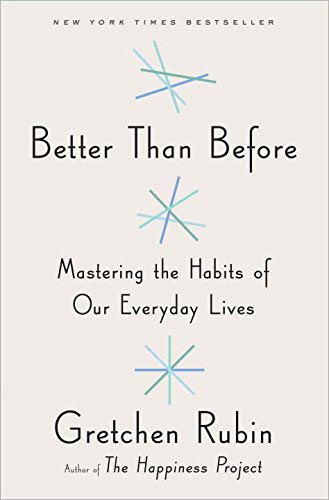Persisting with a habit can be particularly hard when the habit doesn’t yield flashy results. While there’s the satisfaction of knowing that I’m doing what’s good for me and holding myself to my intentions, rarely do I achieve glorious outcomes. I’ve found, however, that if I can get through this dry period, the habit truly takes over and proves itself by making my life better than before.
– Gretchen Rubin
Better Than Before
It’s the title of Gretchen Rubin’s new book and my mission as a personal trainer. I always tell clients if I don’t leave them better than I found them than I haven’t done my job. Her quote also explains the challenge of my process. Real fitness, real change, isn’t quick or glamorous. Finding the right way to guide people through that “dry period” of forming foundational habits is tough. Getting them to the point where all of the hard work seems worth it isn’t easy. Putting together an exercise program is a snap. Getting people to do their exercise homework isn’t. Explaining how food works in the body and the simple rules of balancing the plate isn’t difficult work. Helping clients change their thinking about their bodies, the choices they make and their relationship with food is the real work.
That’s why I am such a student of behavior change. Every time I read a book like Switch or The Willpower Instinct my goal is to get new tools to help my clients make lasting change via the formation of new habits.
The thing about Better Than Before is that most of the tools aren’t really new. Scheduling, Monitoring and Convenience are classic behavior change tools. Waiting 15 minutes (delayed gratification) before reaching for the cookie and leaving your gym bag in the car (clear the path, set up for success) are common tidbits of behavior advice. The problem is these things don’t seem to work for everyone. Her explanation of WHY this is the case is what I found most fascinating.
Her framework of self-knowledge, called the Four Tendencies, looks at how a person responds to expectations. Basically in this world we have both inner expectations (the goal we set for ourselves to meditate for 15 minutes) and outer expectations (the boss expecting you at the 8 am staff meeting). Some of us respond best to both (Upholders like me), while others respond best to inner expectations (Questioners like my husband Brian) or outer expectations (Obligors like most of my clients). There are also those who really don’t respond well to either. She calls them the Rebels.
The curve is bell shaped. Upholders and Rebels are on the tails with a majority of the population being either Obligors or Questioners. Most strategies, as she readily admits, appeal to the Upholder nature. We love to-do lists and schedules. We have no problem making a meal plan or keeping a gym date with ourselves. If we set a rule for ourselves, we follow it.
I know that most of my clients are Obligors and they come to me for accountability. Obligors do well when they commit to others. The hire me so I am waiting for them to do their workout. They need to have someone to answer to because answering to themselves just doesn’t do the trick. Sometimes I forget this. I fall back to my Upholder tendencies, relying too much on the tricks that work for me. Despite the fact that I say it all the time, I forget that everyone is different. I sometimes forget what the beginning of this journey is like.
When I remember the need for accountability, I hit another issue. The biggest problem I encounter is that most of my Obligors are already over obligated. The stress of work deadlines, kids involved in multiple sports, commitments to book clubs and charities and husbands who are less than helpful with cooking and housework make my request to go to the grocery store seem extremely daunting. I feel caught between a desire to hold their feet to the fire about homework and a fear of pushing them closer to the edge of rebellion (and the pint of Ben & Jerry’s the husband insists on keeping in the freezer).
I REFUSE to use exercise as punishment. If they skip home workouts their training sessions will be tough enough as it is. I don’t need to make them do 10 burpees as penance. If the food log is blank I believe it’s better to encourage them to start at the next meal instead focusing on what cannot be undone and the shame of an incomplete assignment. Yet I know I need to do a better job with accountability because that is their whole reason for seeking me out in the first place.
By the time I finished the book, I had managed to gleam a few ideas that may provide some new ways to keep Obligors accountable while being sensitive to the stress of modern life.
- The obligation doesn’t have to be to me. It can be to their Facebook friends or their co-workers. All they need to do is announce their intention to walk daily online and someone will hold them to it. If they tell their kids or office mates that they are no longer eating sugar, they are now obligated to them to not eat sugar.
- I need to help them avoid rebellion and burnout by encouraging treats, not food ones preferably. As part of the weekly workout schedule I need to include things they want to do for pure pleasure and are no way tied to a reward system. By adding “take a nap” or “watch an episode of Orange Is the New Black” to their plan it helps them avoid guilt of taking time for themselves. The time to refresh will actually strengthen willpower.
- If I frame an assignment in terms of the benefit to someone else it can be extremely helpful. While they may have an issue going for a walk themselves, telling them to walk the dog because it’s good for the dog might be more effective. They may struggle to eat breakfast for their own health. However if I frame it in terms of eating breakfast with the kids so they can concentrate in school they may be much more successful.
These tips also work with the Upholders and the Questioners, especially if the Questioners can see the logic for doing so. The Rebels are another story. I don’t think she offered any solid advice for the Rebels. All I can do is offer my time, my expertise and acknowledge that there are just some things a personal trainer can’t fix.



